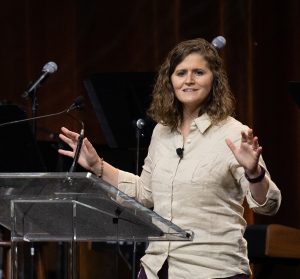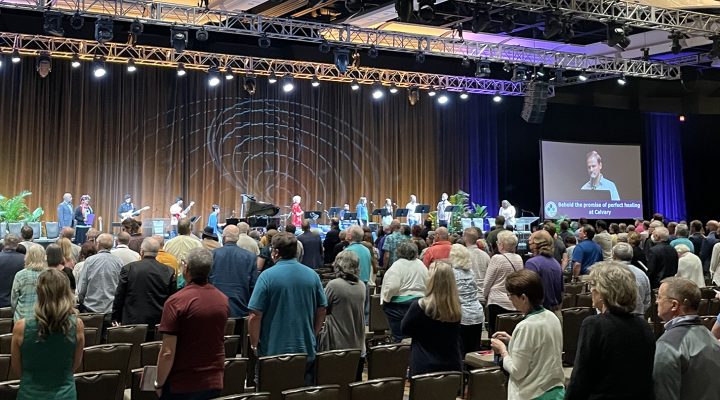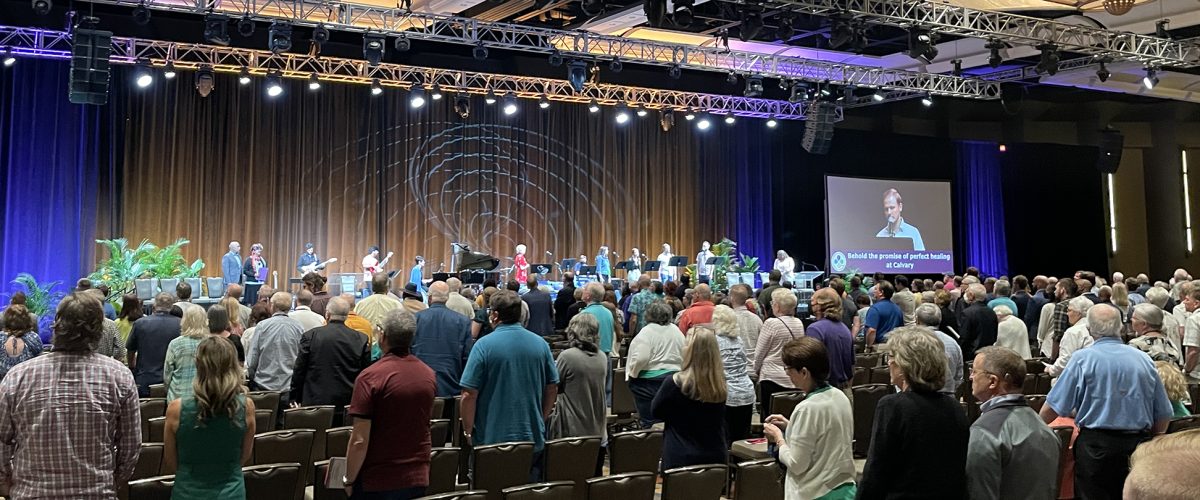Testimony is the cure for the despair that afflicts people and churches after two years of pandemic and politics have tried American religion by fire, Courtney Stamey told participants in the Cooperative Baptist Fellowship June 29.
While the Southern Baptist Convention meeting just two weeks earlier reiterated its absolute ban on women preaching, CBF featured a female pastor in the opening worship session of its General Assembly.
The selection of Stamey, who is young enough to have been raised in and educated by the Baptist ecosystem created since CBF split from the SBC in 1991, illustrates CBF’s lifelong desire to lift up women as equally called and gifted by God. Despite those beliefs and aspirations, the reality in Baptist churches across the nation has been much slower, though, as recently reported in a national survey by Baptist Women in Ministry.

Courtney Stamey (Photo: CBF)
Stamey, senior pastor at Northside Baptist Church in Clinton, Miss., since 2018, is among the 105 women currently serving as pastor or co-pastor of CBF-affiliated congregations.
Drawing on a text from Psalm 66, she declared: “We need a testimony this evening.”
Whether that takes the form of crying out, shouting, praising or shaking one’s fists, “we need to know deep in our souls what remains.”
She acknowledged the reality that this was the first time since 2019 that the Fellowship had gathered for its General Assembly in person and that so much has happened since then, including the pandemic, the national reckoning over race, divisive politics and fatigue from it all.
The psalmist says of God: “You have tried us as silver is tried.” Stamey picked up that thread and compared the experiences of the past two years to a kind of trial by fire. The original reference was to the process of purifying silver, where under high heat all impurities separate from the true precious metal.
Such a fire is “not intended to damage or destroy that silver … (but) to reveal what it truly is,” she said.
For Christians, one important way to seek refinement is to develop and share a testimony, she urged. “Sharing our testimony is how we will get to the silver, how we will get to what remains.”
Amid all the problems of the moment, including a ferocious affinity for Christian nationalism, “the thing that keeps on troubling me, that’s stirring up in my soul, is how all of us good Christian folks who are always concerned about what’s going on in the world haven’t been honest with ourselves about what’s going on in the world.
“I suggest that we submit ourselves to that purifying fire and testimony so that we might find what remains. … What I’m challenging us to do is to find what is the dross and what is the silver.”
But an important note about testimony is “we can’t do it alone,” she explained. “A testimony needs ears to hear it, and it takes courage to say it out loud. … Testimony is honest, and that’s why it’s so difficult.”
“A testimony needs ears to hear it, and it takes courage to say it out loud. … Testimony is honest, and that’s why it’s so difficult.”
Stamey recalled an adviser once telling her people may choose one of two things to do with emotions: “We can talk them out or we can act them out. … Testimony is a way to talk through what is going on inside us and to partner with one another in the healing process.”
She later added: “Once we talk honestly about our experiences, about where we are, those experiences don’t have control over us anymore.”
Despite the many challenges Christians and churches have faced — and face still — something new and beautiful is emerging, Stamey said.
“Do not confuse the dross for the silver. Here is what remains: A body of Christ, more welcoming, more affirming than we could ever imagine it would be. … It is a body of Christ willing to recognize its privilege. … It is a body of Christ challenged by justice. … It is a body of Christ more agile. … It is a body of Christ more willing to hear the call of the Spirit. … It is a body of Christ more willing to be healed by the Savior. … It is a body of Christ more willing to be imaginative like the Creator. … It is a body of Christ more willing to be who we always were called to be and we were afraid to be. … This is what remains: Us.”
Related articles:
Annual report on Baptist women in ministry finds some gains but serious losses due to COVID


